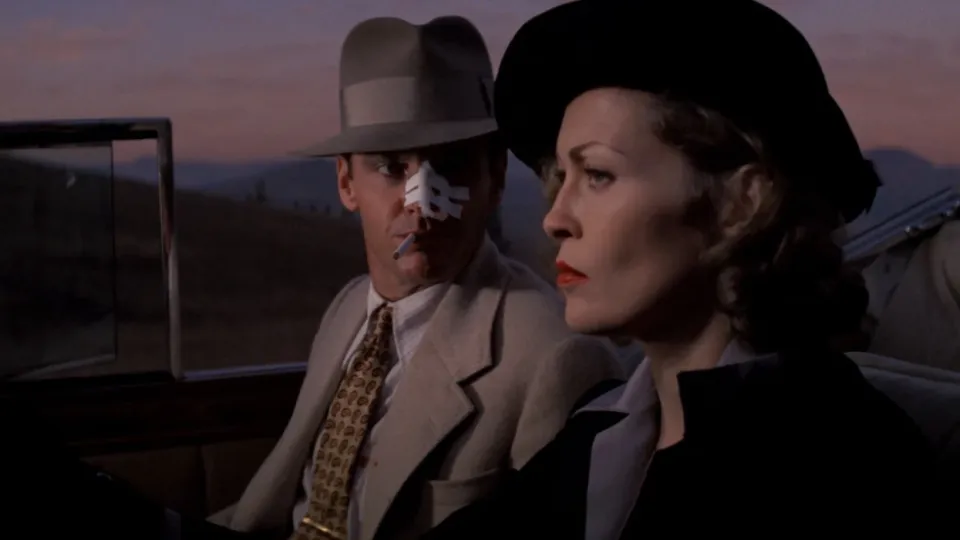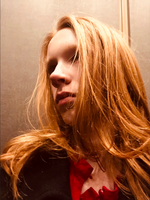Jack Nicholson's Taped-up Nose: Dialecticals II

Right around the midpoint of Roman Polanski's 1974 mystery thriller Chinatown, when Faye Dunaway and Jack Nicholson were gallivanting around a nursing home searching for the answers to a complex criminal conspiracy, their sexual tension mounting to an unsustainable climax, I had the feeling that I was experiencing something greater than cinema or even art: pure, unbridled emotion evoked in me from what I was viewing. As cliche and silly as it sounds, I chase that feeling when I find it in books, movies or music; I adore pure perfection in media. Hence, my Dialecticals, which I started last month to dissect my reading, viewing and listening each month through common themes.
The Immaculate Struggle
In Otessa Mosfegh's My Year of Rest and Relaxation, we meet our unnamed narrator in one of her few bursts of wakefulness in the year she spends in the stasis of sleeping pills. She is pretty, well-off yet still unsatisfied, in the tradition of Plath or Didion, and seeks escape through pharmaceuticals. Though Mosfegh endeavors to show the uglier side of the narrator's despair, she often circumvents the darkness and eulogizes her main character's good fortune, writing "I ordered whatever I wanted from glossy catalogues...I had a stack of credit cards in my wallet..." and "I was young and blonde and pretty." Through establishing her voice as privileged, she makes her fight against mental illness somehow more profound; the narrator is not depressed by her situation, but by some larger ennui, an inability to be happy. This is what I refer to as "the immaculate struggle," a character surrounded only by mirth but restricted from feeling it themself. In art, it can be the deepest sadness.
In Cameron Crowe's High Fidelity (2000), we encounter a cynical, fourth-wall breaking record store owner, played brilliantly by John Cusack, whose entire energy is consumed by music and women. Following the departure of his girlfriend, he traces back his four biggest breakups, endeavoring to discover what made the relationships end. None of the blame is ever balanced at him; at one point, he remarks that his ex Charlie, who were are led to believe is perfectly lovely, is a "deep, deep well of shallow," (this whole sentence is an oxymoron). His bristly personality and average physique fail to stop him from having sex with half a dozen beautiful women throughout the film, including Lisa Bonet in a memorable overture. And he is not happy. He is, in fact, consumed by the immaculate struggle, like Mosfegh would render two decades later in My Year of Rest and Relaxation.
Experiments in Fragmentation
Often, an artist chooses to split up a narrative in order to accentuate it. I first noticed this in Christopher Nolan's Memento (2000), in which a claims investigator with memory loss becomes convinced that his wife was murdered by a man named John G. The film is told in his halting psychosis, with half of the scenes shot in black and white and moving chronologically, while the others are in color and moving in reverse. The result is an experiment in fragmentation, in which two movies with similar plots are seen at once and gradually revealed to be one and the same. Memento perhaps could have been told differently, in a more conventional structure, but it would have lost something along the way: the gradual acceleration of tempo that occurs in such an experimentation.
In music, there is no greater example of this phenomenon than Radiohead's In Rainbows. Often lauded as on of the greatest albums of all time, it follows no conventional structure of song grouping, and listening front-to-back is an abrasive experience, as the verve of "Bodysnatchers" fades into the haunting "Nude" than the distorted sounds of "Weird Fish (Arpeggi)." Each song is a wonderland onto itself, and a more conventional structure would have probably consolidated the brighter songs and heavier ones in their own clusters, but the group's choice to splice them all together into a type of anti-record is a braver experiment, and one that, like Memento, ultimately paid off.
Strung Out Locales
The opening line of Graham Greene's novel set in 1930's Mexico, The Power and the Glory, reads, "the street was dark with shadows, and across it lay the huge puddles left by the rain." The former pulp writer never lost his knack for writing settings, and this is perhaps his masterpiece in that regard. He renders the landscape as hostile, both from natural and human forces, noting the river's "brown current...breaking the banks here and there" and the town as "full of soldiers, half-drunk and ill-paid, with guns in their hands and boredom in their eyes." In this landscape, the characters themselves are non-entities, wandering through the stricken locales, struggling only to stay alive and protect themselves. It's what makes reading the novel feel so harrowing and so desperate: the setting itself.
In the 2005 cult horror film The Descent, six women take a casual cave-diving trip and are trapped beneath the earth, where they encounter a race of cannabilistic "crawlers" who are swift to disembowel them. In a setup such as this, it is surprising that the setting itself is the most anxiety-inducing part of the film; it reads more like an adventure documentary like Free Solo than a space thriller like Alien, with the character's physical position and remoteness from civilization the true monster. The scriptwriters had to only layer in some internal conflict, group dynamic and yes, some blood, to make it a classic. Like with Greene's novel, the setting forms the basis for the story, not vice versa. And that's the scariest part.
books from this month: A Supposedly Fun Thing I'll Never Do Again by Dave Eggers; The War On Cliche by Martin Amis; All About Love by bell hooks; Detransition, Baby by Torrey Peters; My Year of Rest and Relaxation by Otessa Moshfegh; The Bell Jar by Sylvia Plath; Brutes by Dizz Tate; Post-traumatic by Chantal V. Johnson; The New Journalism by Tom Wolfe et. al; Brighton Rock by Graham Greene; The Power and the Glory by Graham Greene; Ulysses by James Joyce; True History of the Kelly Gang by Peter Carey; In the Time of Butterflies by Julia Alvarez; Beyond Good and Evil by Friedrich Nietzsche.
films from this month: The Maltese Falcon; Cat on a Hot Tin Roof; Memento; Rushmore; High Fidelity; Friday; The Social Network; Booksmart; Chinatown; The Score; 10 Things I Hate About You; The Descent; Juice; There Will Be Blood
albums from this month: J. Cole's 2014 Forest Hills Drive; Bad Bunny's Un Verano Sin Ti; The Smiths' Strangeways, Here We Come; Frank Sinatra's In the Wee Small Hours; Solange's A Seat at the Table; Tame Impala's Currents; The War on Drugs's A Deeper Understanding; Radiohead's In Rainbows; Bjork's Debut; The Cocteau Twins's Heaven or Las Vegas; Beach Houses's Beach House and Teen Dream; Mitski's The Land Is Inhospitable and So Are We.
